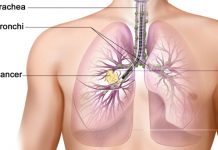A combination of chemotherapy agents that have been tested in other tumor types appears to be a promising alternative to standard treatment for advanced non-small cell lung cancer, according to a report.
In a phase II multicenter study of 56 patients with an advanced form of this common lung cancer, endpoints including response rate, progression-free survival, and overall survival from use of S-1 and irinotecan were similar to, or better than, those reported from standard treatment with platinum-based chemotherapy regimens.
Because the study had only a single arm – meaning all patients received the experimental therapy – the researchers cannot say if this regimen offers more benefit than standard treatment.
But they did report that side effects resulting from the experimental therapy appeared to be much less severe than those typically seen with standard treatment.
“There continues to be reluctance on the part of both patients and treating physicians to accept the toxicity of platinum-based therapy, given the associated small gain in survival, so active therapies with improved toxicity profiles are clearly needed,” said the study’s lead investigator, Isamu Okamoto, M.D., Ph.D., associate professor in the Department of Medical Oncology.
Read more at EurekAlert















